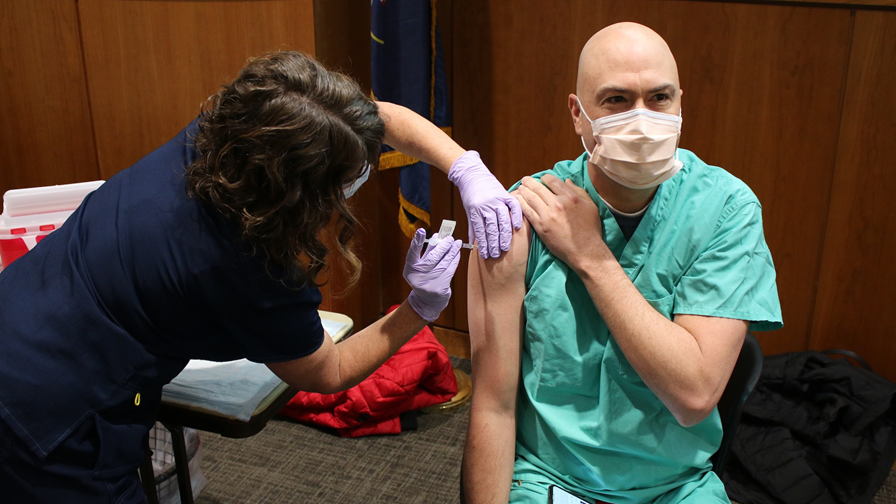
Intermountain has changed the tool used to book second-dose vaccination appointments from Microsoft Bookings to Qualtrics. The change happened January 8 and over the weekend. The new software will help us better support operations, safety, and effectiveness of our vaccine program.
Transitioning to the new tool is important to match the timing of an individual’s access between doses for the Pfizer/BioNTech (21 days) and Moderna (28 days) vaccines with the timing proven most effective from the clinical trials. These recommended intervals are minimum separation times, meaning second doses administered before then may reduce antibody response. Postponing second doses past the interval won’t decrease effectiveness of the vaccine, but as close to 21 and 28 days as possible is recommended.
Second doses can be delayed, but shouldn’t be accelerated or avoided altogether:
- The first dose of the vaccines creates partial protection and limited immunity. The second, booster dose reactivates “memory” cells that remember the substance in the first dose to respond to and fight the virus. When reactivated, the body produces more powerful antibodies, offering better and longer protection.
- There may be mild to moderately severe side effects from the second dose, such as joint pain, headache and low-grade fevers. Due to the possibility of 24 to 48 hours of these side effects, we encourage caregivers from the same unit, area, or function to stagger days and times that they sign up to receive the vaccine. Please consult with your leader on dates and times before you schedule your appointment.
- There’s no concern if vaccine spacing between doses is longer than the recommended 21 days for Pfizer vaccine or 28 days for Moderna vaccine. There shouldn’t be any impact to effectiveness by getting a vaccine at a timeframe longer than the recommended spacing. Potentially, the way vaccines work, a longer timeframe between doses may enhance effectiveness.
- Vaccine effectiveness can be impacted if second doses are given too soon, not allowing for appropriate immune responses.
Booking a second-dose vaccine appointment:
- After you received a first dose of the COVID-19 vaccine, you’ll receive a secure email invitation in seven to 10 days. The link in the email will be unique to you and can only be used once.
- The email link will only allow scheduling for a minimum 21 days after the first for the Pfizer/BioNTech vaccine and a minimum of 28 days after the first for the Moderna vaccine.
- It will also ensure you register to receive the second dose at the same location you received your first dose.
- If you’ve already scheduled a second vaccine dose through Microsoft Bookings, you’ll have an appointment cancellation and receive a new email from Qualtrics. The new email subject line will read: “Schedule your 2nd COVID vaccine dose.” After scheduling, you’ll get a confirmation email with the date, time, and location of the appointment.
Can I still get the COVID-19 vaccine if I’ve been exposed to, or had, COVID-19?
- If you’ve had known, unprotected exposure to COVID-19 within the last 14 days, you’ll be eligible to be vaccinated after the quarantine period has ended.
- If you have a current COVID-19 infection or COVID-19+ diagnosis since the time you received your first dose, you’ll be eligible for the second dose 90 days after COVID-19 symptoms have gone away.
- If you had a severe (anaphylaxis) allergic reaction to any previous dose or component of COVID-19 vaccine, you won’t be eligible for a second dose.
- If you had an immediate allergic reaction (within 4 hours) to a previous dose of COVID-19 vaccine or any component of its vaccine, you won’t be eligible for a second dose.
- If you had an immediate allergic reaction (within 4 hours) to polysorbate, you won’t be eligible for a second dose.
- If you received another vaccine (of any kind) in the last 14 days, you’ll be eligible for your initiation of the COVID-19 vaccine series 14 days after your last vaccine.
If you’d like to further discuss your personal circumstances, please contact your local Employee Health nurse.
If you need support in scheduling, canceling, or rescheduling your first- or second-dose vaccine appointment:
- Cancel/reschedule your appointment using the appropriate link from your appointment confirmation email. No-shows who haven’t notified with a cancelation or rescheduling at least 24 hours before the scheduled time, can waste valuable vaccine resources.
- If you’re unable to receive the vaccine within the available timeframe or at the same location, or experience difficulty scheduling or rescheduling your first- or second-dose vaccine appointment, contact AskHR by calling 801-442-7547 or by emailing AskHR@imail.org, who can identify a time and location for you.
Follow visitor guidelines when arriving at your vaccine appointments:
- Our current visitor guidelines still apply to you and your loved ones when you visit an Intermountain facility for a vaccine appointment, so we can best protect caregivers, patients, and other visitors at any given time. Any visitors or companions with you must be 18 or older, be in good health, and not COVID-19 positive or exhibiting any COVID-19 symptoms, and be limited to one visitor/companion at a given time.

